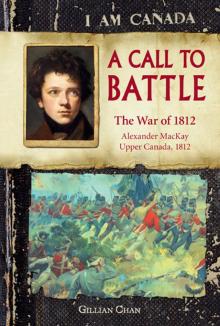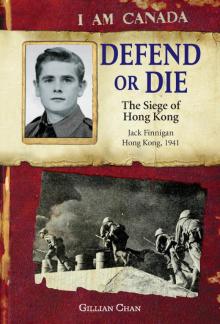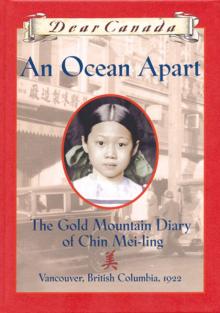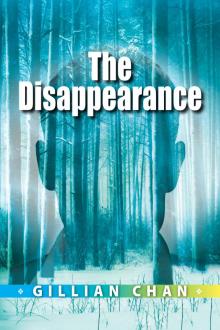- Home
- Gillian Chan
Defend or Die Page 2
Defend or Die Read online
Page 2
There was a gleam in his eye that I didn’t like one bit, so I stood as rigidly and perfectly still as I could.
“What did you say your name was, boyo?” The voice was quieter now, but he was circling round me like a dog looking at a bone.
“Finnigan, Sarge. Rifleman Jack Finnigan.”
“Sergeant!” he bellowed, spittle flying. “You address me as Sergeant, or Sergeant Oldham. And one thing you need to learn right now is that you don’t do anything unless I tell you to. Is that clear?”
I couldn’t argue, hoping that this would be the end of it.
“Just remember, Rifleman Finnigan, that I’ve noticed you and you don’t want to be noticed by me. Oh no, you don’t, boyo.” He tapped a gloved finger to the side of his nose and stalked off, making me want to call him a choice name, but I wasn’t foolish enough even to mutter it under my breath.
Our unit went for a march then. I was so rattled that I kept my eyes straight ahead, ignoring Ike when he tried to catch my eye and pull a face.
By the time we got back, the rest of the battalion were at ease, smoking and chatting. They eyed us up before they boarded again and their officers did too. Lieutenant Colonel Home, our commanding officer, watched us, along with his second-in-command, Major Price, who looked unhappy. Later we knew why, as someone overheard him say that he had been sold a crock and that it was obvious that we included the “bad boys” of the training centres, the ones they wanted to be rid of.
I thought this was a bit much. I was keen enough. Once I turned eighteen, I had been planning to enlist anyway, but those plans kind of got delayed once Alice became my girl. I didn’t want to leave her. In basic training I’d done all right, too. One of the sergeants said that I would be a really good soldier, if only I could control my mouth a bit more.
Maybe some of the regular joes heard what the major said, because they were none too friendly at first, but on a train journey across the country you all get thrown in together and the barriers break down. I was surprised at how many were Frenchies, although most spoke English. Some had accents so thick it was hard to tell what language they were speaking! I was glad that we were only joining them now, because the stories they told of garrison duty in Newfoundland made me shudder — boring as could be and cold to boot. It was there that they got their mascot, Gander, a great brute of a black dog. He would romp down the aisles, looking more like a furry pony than a dog. He was about the best thing though. At least he gave us a laugh.
Everyone was trying to find out where we were going and why. All we knew was that the battalions we were joining weren’t up to full strength, so we were going along as extra reinforcements, but as to where, everyone was close-lipped. We had been given tropical kit though, so maybe my guess of India wasn’t so far-fetched after all.
I thought the next two days were hell, but now I know what hell really is.
The whole train trip was stop-start. Winnipeg was one of the longest stops. We picked up a whole other battalion, the Winnipeg Grenadiers, and there was a route march through the town with the band playing and Gander strutting at the front. The officers were trying to keep us busy and tired, I reckon, as we had either a parade or a route march twice more that day at different stops. Some of the guys complained, but I didn’t. Bloody Oldham seemed to find me whenever we got off, just waiting for me to slip up. I was determined not to give him the satisfaction.
It was a relief to finally reach the dockyards at Vancouver, which we did on the morning of the third day.
North Point Camp, Hong Kong Island, February 1942
I can’t get the hang of keeping these entries short. Half the trouble is what else is there to do? It helps, too, to keep my mind off food. Well, the lack of it. For meat-and-potatoes men, two bowls of watery rice and maybe a sliver of meat or rotten fish a day doesn’t cut it. My stomach hurts with hunger all the time. The worst thing is that the food goes right through you. We all have the runs, which without proper latrines is disgusting. We have to go over the seawall. Peeing is easy — you can stand up and let loose. The other, though, oh boy. You have to squat, stick your bare bum out over the wall and either hold on for dear life to a rope they have strung up, or buckle your belt round it and hope it will hold. Maybe I shouldn’t write things like that down, but I want people to know what it’s like.
We’re kept pretty busy trying to get the camp in order. It was a shambles when we arrived. It had been a camp for Chinese soldiers, then used for stables once the Japanese invaded, so we had to shovel the crap out. And flies, you wouldn’t believe the flies. There were dead horses too, and the only thing we could do was chuck them over the seawall and hope they would float away. It wasn’t just the horses down there. I used to shut my eyes when I peed, as I didn’t want to see the bloated bodies that were there too. Chinese, mostly.
We’re all lousy, and I do mean we have lice. Ma would have a fit if she saw the state of me, covered in bites. There’s bedbugs too, and the flies, oh my God, the flies! When you try to eat, your food is covered in a glistening mess of them. It got so bad once that the guards offered rewards for catching them: a pack of cigarettes for each hundred we caught. I don’t smoke, but Ike does, so I caught them for him. We were crafty about it. When the guards started weighing them rather than counting them, some guys even attached tiny weights to the flies’ feet. Can you believe it? Me, I didn’t go in for that, but I had to admire Simon Easton’s ingenuity. He got hold of a can with a lid on and he put a lump of rice in it and when it was covered with flies, he slammed the lid on and waited for them to breed in there. The guards weren’t stupid. They quickly got wise to what we were up to and the rewards stopped. Our doctors encouraged us to keep going with the fly catching though, as the flies were filthy carriers of disease.
At Sea, October–November 1941
I’d been looking forward to a sea journey, never having been on anything bigger than the ferry to Toronto Island, but having done it now, I wonder why. The ship SS Awatea was beautiful, or it had been. It was an ocean liner that the British had commandeered as a troop ship. It had been painted a dull battleship grey, but the interior was still in the original condition. Though that was for the officers, of course. They had the swanky cabins and the fancy dining room. Us low-lifes were packed into the innards of the ship. Our hammocks were hung over our mess tables, so we always ate in the stink of feet and sweat. That is, if we could eat. Some guys were seasick the whole way over, so add the stench of vomit in too. And the food, oh we thought that food was bad. I’d give anything to have it now. The first night on board they kept us waiting for hours before dolloping out tripe, of all things. Can you believe it? Boiled cow’s stomach in all its white, glistening, rubbery glory! I nearly puked. It was so bad that some of the Grenadiers got really bolshie about it and stormed off the ship. Only one Rifleman went with them. I was tempted, but I saw Oldham giving me a dirty look so I kept my head down.
It was touch and go for a while after the Grenadiers went ashore. The captain took the ship out to sea so that no more men could leave. Some sergeants and officers had been left on shore with the rebels and the protest fizzled out eventually as the men were talked down, although if the gossip was true, some took the opportunity to take off completely.
The food didn’t improve much. We didn’t get tripe again, but I grew to hate the mutton that turned up all too regularly. One of the other Royal Rifles, a guy even younger than me, made up a rhyme about it. I can’t remember it all, but one line went something like, “Our cheeks were just juttin’ with nuttin’ but mutton.” We used to mutter it under our breath whenever that hated meat appeared.
The food finally got so bad that we decided we’d had enough and took action. It was like that old game, Chinese Whispers. Word spread from man to man and the next time the huge tins of rank, grey mutton topped with greasy globs of fat appeared and each man had ladled out a portion, we did it. There was a great clatter as we pushed back our chairs and stood as one, holding out our plates in
front of us. One voice shouted out, “One.” Another yelled, “Two.” When the final “Three!” echoed, we all turned our dishes over and stood to attention, watching the disgusting contents flop greasily down onto the tables, and we started a low chant of “Baa! Baa! Baa!” that gradually got louder until it was like thunder.
We just stood there, the upside down plates held in front of us. The sergeants weren’t in on it, of course, and they rushed in bellowing. Some officers were called, but what could they do — put every man jack of us on a charge!
We fell silent as we were ordered to clean up the mess. The sergeants were ranting and raving about how we would go hungry because we needn’t expect a replacement meal. They couldn’t even pin down one man as the organizer because we’d been careful enough to have the order given by three different voices.
Sergeant Oldham worked his way over to where Ike, Paddy Houlihan and I were. “Rifleman Finnigan,” he snarled. “I wouldn’t put it past you to be one of the organizing geniuses behind this little incident.”
I smiled at him, but stayed silent.
He reddened, but said nothing more, just tapped the side of his nose as he looked at me, before he walked away. I was getting awfully tired of that gesture.
We were heading west and Ike, who was a bit of a secret bookworm, worked out where we might stop first. It had to be Hawaii, he said. I was excited, because that kind of exotic location was not bad for a boy who’d never been anywhere but Toronto and Barrie. I shouldn’t have got my hopes up, though, because once we reached Hawaii, they didn’t let us off the damn boat! It didn’t help that in Honolulu there was a band on the dock and girls wearing nothing but bras and grass skirts shaking their hips in the sexiest dance I’d ever seen. Guys were leaning as far over the railings as they could, their tongues hanging out as they tossed money down to the girls to encourage them to shimmy a little more. Me, I figured if the men were dumb enough to pay, I’d save my money and enjoy the show for free!
In Honolulu our little protest about the mutton had some effect. Fresh meat was loaded on board — beef — and oh boy, did we appreciate that! I dream of that beef still. I even dream about the mutton. Tripe, though, that would still be a nightmare.
Once we were at sea again they finally told us where we were going — Hong Kong, to reinforce the garrison in that colony. So I’d been wrong about India, but just the name Hong Kong sounded exotic!
The farther west we went, the warmer we got. Thank goodness for our tropical uniforms, because the sweat-soaked woollen uniforms we had worn when boarding did nothing for the stink in our quarters.
We spent as much time on deck as we could, even sleeping there once it was warm enough. We had lectures, plus some attempts at training and drill, which were pretty pathetic due to lack of space. I didn’t mind. It helped pass the time. We got to watch some movies — one really good one called Citizen Kane — and there was always a floating poker game or two going on (completely against regulations, of course). I played a bit and even won too, but stopped while I was ahead. I wanted money to spend in Hong Kong. One of the sailors who had been there made our eyes light up with his stories of what you could buy there and how cheap it was. With the seven hundred bucks I’d won, he said that I would live like a king.
They finally got round to organizing the new guys. Some were attached to Brigade HQ, being held in reserve to fill in where needed. Me, I was assigned to a new platoon in D Company. The top brass had been with the Rifles for a while, but the rest of us in the platoon were all from the new lot — mostly from Ontario — and even a Yank.
I was pleased at first. Major Parker, the company commander, was all right, and the NCOs didn’t seem a bad bunch on the whole. Some of them, like Sergeant MacDonell, were hardly older than I was, but he had come up through the militia, not just joined up in a rush like me. I wouldn’t have minded a sergeant like him, but that was where my luck ran out again. Of course we got my enemy, Sergeant William Oldham. I’d tried to avoid him as much as possible, hoping he’d forget about me, but by the knowing grin he gave me when the platoon’s roster was called out, he was going to take great pleasure in making my life a misery.
Kowloon, Hong Kong, November 1941
We smelled Hong Kong before we saw it.
It was like nothing I’d ever experienced before. The air was heavy with the stink of rotting fish on the wharves. There was food cooking somewhere — something spicy — there was sewage, and it all mingled together and was just different. It made me want to puke, but it made me want to draw a deep breath in too.
I was going to crack a joke, using a line from The Wizard of Oz about not being in Kansas any more, but Ike spoke first. “Hey, look at that!” He nudged me in the ribs. “Have you ever seen anything like it?”
There were so many things I’d never seen before that at first I wasn’t sure what he meant. He pointed down to where the boat was pulling alongside the wharf. A whole crew of semi-naked boys were there, waving and pointing at the water.
A sailor pushed by us to the railings. “Watch this,” he said and tossed a coin over the rails.
Instantly the boys dived into the water, causing a great splashing. I was sure they would be killed, they were so close to the boat, which still shifted even though it was at anchor. A hand clutching the coin came up first, then a boy’s smiling face. The others in the water looked disappointed, but not for long, as then we got the idea and started tossing a rain of coins over the side. I think we’d have happily done it all day, but we got the order to form up and disembark.
The whole sense of Hong Kong being foreign just kept growing. There was a huge Indian soldier saluting at the bottom of the gangplank as we came down it. He had an oiled, black moustache like two big tusks, and a turban that added at least a foot to his height.
“Glad he’s on our side,” I whispered to Ike. “I wouldn’t like to meet him in an alley on a dark night.”
“Silence in the ranks!” It was Oldham, of course. I don’t think he knew who was talking, thank goodness.
There was a band — some Scottish regiment, as there were bagpipes — bigwigs who looked us over, and then we were finally off, marching for the first time in a foreign land. Gander was at the head of the parade with his handler, all proud in his black leather harness with his red sergeant’s stripes and the Royal Rifles crest. I swear the locals were more interested in him than us.
It took us about an hour or so of marching to reach our barracks. I wanted to stop and stare at the strange sights that were both terrifying and exciting in equal part, but it was eyes front all the way, and I could only snatch glimpses, more like snapshots than anything else. There weren’t any skyscrapers, but there were solid stone buildings like those at home, right next to more exotic looking ones with many balconies and carved and painted fronts. The balconies on both sides of the road were crowded with people watching and cheering.
I think we made a fine showing. Compared to the locals we were tall, well-fed, muscular boys. They seemed on the whole to be small and scrawny. I puffed my chest out more, proud to be there.
It wasn’t all parade and pomp. Among the glimpses there were disturbing things — a beggar with no legs; another with what looked like open sores on his face; an old woman almost bowed to the ground with the heavy baskets she was carrying on a stick across one shoulder; women in rags with gaunt children, begging.
Our barracks were in Sham Shui Po, Kowloon, and they were all right, better than I expected. Our platoon was bunking together and Oldham left us alone to settle in. While we were doing that, a group of Chinese boys came in and started pulling out our stuff from our kit bags. We tried to protest, but one of them said, “Mister, twenty-five cents a week, we be your boys?”
I wasn’t sure exactly what a “boy” might do, but I certainly wasn’t going to miss that amount of dough. “Sure,” I said, and handed the money over. The boy rushed out of the room.
Killer Kilpatrick laughed at me for being a fool. “That’s the
last you’ll see of him or your money.”
I get on with most guys, but Killer — who was a bit of a loudmouth — had started to rub me the wrong way soon after we embarked on the Awatea. He was one of those guys who had an opinion about everything and seemed to get a kick out of putting people down.
But I had the last laugh when the boy reappeared with towels, a bowl of warm water for me to wash my hands, and a cup of tea. It wasn’t exactly like tea that I knew, being kind of perfumey and with no milk, but I made a show of drinking it and smacking my lips — just to rub it in to Killer as I sat down on my bed and watched my boy square away my kit in the locker, ready for inspection. He did it far better than I could have.
The others quickly decided they wanted boys too, and were in the process of handing over their money when there was a tremendous ruckus outside. Gander was barking; voices were yelling in both English and Chinese. We ran out as a group and couldn’t believe what we saw. On the other side of the fence a group of Chinese had hold of Gander by his harness and were doing their best to pull him through the fence. They must have lured him over, since there was a meat bone on the ground in front of him.
“C’mon, boys,” I shouted.
Gander had dug his paws in and was doing his best to break free, shaking his big head, snapping at any hand that came too close as his captors tried to get a better grip on him.
Ike and I were the first to reach him. We grabbed his harness and pulled him back. Killer and Paddy were hitting at the grasping hands with stones they’d picked up. It was close for a while, but our weight was too much, and like a cork coming out of a bottle, Gander flew back, taking us with him. We ended up in a heap of dog and men on the ground.

 A Call to Battle
A Call to Battle Defend or Die
Defend or Die An Ocean Apart
An Ocean Apart The Disappearance
The Disappearance